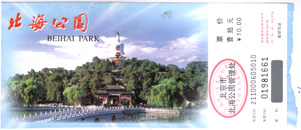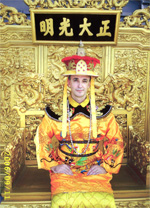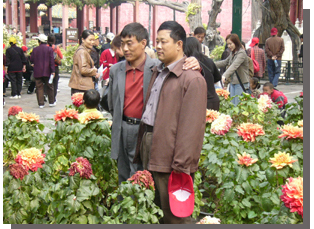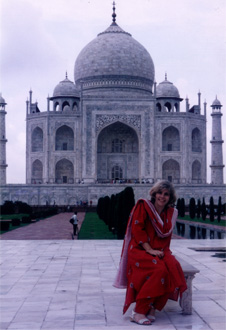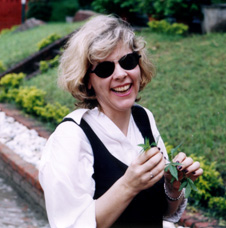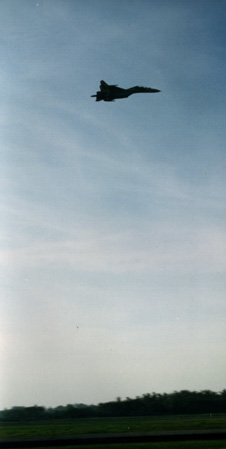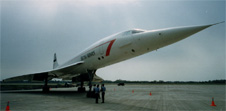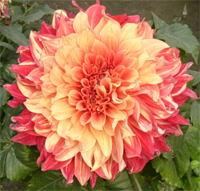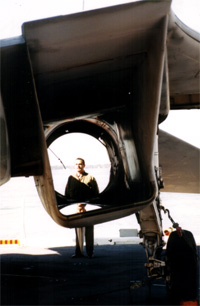Dear Readers at Shelford (and others of course),
“Off to School in Shamoo”? Now that sounds like something out of Dr Seuss. In fact, something just as wonderful and weird as Dr Seuss. But not as wobbly and wavey. In fact, quite the opposite – something very real and concrete and solid in my experience and in my mind’s eye. Shamoo is a village in Eastern Tibet. Is that how you spell the name? I have no idea. But that is what it sounded like so that is how it appears here.
I heard the name spoken thus by a school teacher who had come up to the centre of the village to buy pears from a travelling fruit merchant. He had a set of scales with weights he placed in one tray and the pears in another. He seemed pretty quick with the weighing operation, so much so that I wondered if he was being a bit shifty with the weights. But maybe his deftness was motivated by the swarm of wasps that hung around the ripe pears. He wanted to be done and gone before he was stung. But I thought moving slowly and keeping any pear juice away from my face would have made more sense - lessons I learned from growing up with these things trying to share anything sweet I might be eating or drinking.
The centre of the village is a Y shaped fork in the road, one branch taking you further up into the mountains of this remote part of China, the other continuing on down past the school where the local children and those from around the district took their lessons. Walk down the hill from the pear seller and his humming wasps, away from the little shops selling food, repairing car parts, selling clothes and hawking tea. Down through the dust for two hundred metres, veering left into a lane decorated with birch trees, as pretty and petite and fine as any birch tree anywhere. On your right a farmer, wearing the distinctive white hat of the Muslim Hui (pronounced “whey”) struggles a couple of ploughing mules to a stop, all the better to get a look at you as you wander up the lane. Walk past a tall, old kindly faced man who stops sweeping his straw broom over the lane to lean on its shaft, and observe you and who offers a slow and open smile and the Mandarin greeting of “hello” which sounds like “knee how”. Naturally you respond in like fashion and hope you said “hello” in reply and did not say something offensive. On your left is a tall brick wall and from behind it come the sounds of a tinny loudspeaker system counting out numbers in Mandarin. “Ee” “Arh” “San” “Sher”. No that is not how they spell them but 1,2,3,4 sounds something like that. Arrive then at the school gate and turn left into a large school yard. The excited school children that were scattered in twos or threes outside the gate swell to an enormous number as they crowd around us, chattering and laughing and simply looking at us. I don’t think I have ever had a welcome anywhere quite like this.
Imagine you have never met another foreign person. Ever. Not ever. But you had heard about foreigners all your life. You had seen them on TV. You had never seen a Chinese person. An Indian. A Malay. A Fijian. A Maori. An Arab. Never met someone from Greece, Italy, France or Germany. Someone from Africa, Chile, Iceland. Imagine that the only type of person you have ever seen or heard is exactly like yourself.
Then imagine that for the last two years or more you have been learning the language of one of those countries. From teachers who had learned the language in the same school you are now sitting in. Imagine that the teacher cannot answer many of the questions you have about these people and their language since she has never met anyone else except her own neighbours either.
But also imagine that there are all sorts of legends, stories, fables and myths about the foreigners who speak this language. Imagine that some of those fables tell about massive wealth. About amazing technology. Imagine that you know this foreign culture has many things like music and fashion that you cannot get. But would like to get. A few fables are wonderful stories about how some of those foreigners have helped your own people, with medicine, engineering and aid. But also imagine that those myths and legends tell tales of terrible abuse, cruelty and hardship. Of horrible wars and of exploitation.
Then imagine you are told that, if you learn their language, you will stand a much better job of getting a job, and possibly getting out of this village. Or maybe imagine that you are told to learn this language - for no apparent reason at all.
Imagine that sometimes when having a cup of tea, in a local café with the only TV in town, you see and hear some of the language and people of this language. They seem strange. And far, far, far away. For you live in a remote part of the world. Not even your own people travel here since there is nothing, absolutely nothing to look at. At best, your village is a bus-stop on the road to nowhere.
Suddenly, for the first time ever, you learn that later that morning some people who speak the language you have been learning are going to be in your classroom. You are beside yourself with excitement. This is strange, novel, new, rare. Something you will be telling your parents about that day. “Imagine who we met today!”
As we walked into the school year we had no sense of this perspective. We all wrongly assume that everyone knows what we know. That we all have access to the same information. The same experiences. The same opportunities. Perhaps knowing something about this village will help you understand just how far from the truth these assumptions really are.
To get to Shamoo you have to travel a long way up into the mountains of Western China. You drive up through the beautifully named Sun Moon pass, littered with Buddhist stupas and prayer flags. Down into a broad valley surrounded by rolling, grass covered mountains, guarded by more angled, purple hazed peaks in the distance. You are elevated higher than Mt Kosciusko by a few hundred metres, the height catching you a little breathless if you try and exert yourself. This will be a bleak and hard place in winter. But today it is a warm and pleasant autumn day, although the locals are well rugged up. Just in case I guess.
Shamoo is home to about one thousand people. A many as say, four trainloads of people that pull into Spencer Street station each morning. There are no street lights. No kerbs. No hotels. No post office. No bus-stop. No petrol stations. No pubs. No rubbish bins or rubbish service. No police. Not much at all actually. There is a Chinese medicine man who is four feet tall, stuck behind his hesian door (embroidered by a red cross and which had caught our attention) and who was sorely disappointed that I would not take the couch and be examined. He is the most exotic thing in this place. There are plenty of tea houses and café type eating places. The Hui are, after all, well known for their fine cooking. That reputation is truly justified.
People wait on the side of the road for any vehicles going in whatever direction they happen to be travelling and hope for a bus (twenty seater), trucks, motorbikes. Farmers mingle with farmers. Shoppers who are coming or going to markets. Tibetan monks. Teachers. Mud brick houses. The public toilets are an acre of open ground behind the string of little restaurants. If, while eating, you signal your wish to use the bathroom you are guided to this open ground, surrounded by a thin (non existent) hedge of birch trees. For those who wish some privacy there is an open sty of a shed which affords some modesty . Watch where you walk while heading over to it.
The largest building, mainly out of sight down the hill is the school. More than 1200 students. How can that be when there are only 1000 people in Shamoo? Many of the children bus into school and some come so far they actually board there as well. But the travel rules are strict. If you live more than three hours walk away then you are entitled to a bus ride to school. But if you live say, 2 hours and 45 minutes walk away well, then you walk to and from school each day. That would be like walking from Camberwell into Melbourne city each day – and back, just to attend school.
Here is the problem for these children – Mum and Dad need them on the farm to work. Many can’t finish school, or take a long time to do so. We met a class full of students - 48 in all. They ranged in age from 10 through to 16 years, some attended at an older age simply because they could not get the school hours in during earlier years.
We had actually been invited to take an English class. So we invented a lesson (teachers do that sometimes) based on an Aesop’s fable (a lazy donkey is purchased by a farmer, the farmer places him in a stable and the donkey gravitates to the lazy animals. Farmer returns donkey and demands his money back since he figured the new donkey was going to be lazy too. Moral: you are known by the company you keep) – short, words were relevant to a farming community and we only had to fill an hour. In the end the lesson ran for two hours, we taught them to sing “Baa Baa Black Sheep”, along with describing all sorts of Australian animals (they have anteaters so the echidna was a hit), all supported by lots of sketches on the blackboard.
As we walked into the class we were confronted by students suddenly standing to attention behind their desks and applauding. A bit embarrassing. We sat them down, dampened the clapping, took a deep breath and introduced ourselves by doing that age old teacher thing of writing our names down on the board. The names were instantly copied into their books. Even the donkey I drew later, ended up in their books. And the echidna, koala and a few other mad sketches.
While we wrote on the board the room was in complete silence as they copied words into their notebooks. Students stood when answering questions. They were respectful, intense, earnest, polite – and delightful. And so very eager to learn. This after all was the only chance most of them were going to get to obtain an education. So they were grabbing it as hard as they could. And they could mimic an Australian rounded vowel extremely well. We were very proud of their “g’day mate” which they parroted beautifully.
The school had none of the amenities we associate with a school. No ovals, playing fields, climbing equipment, or trees. Only basic buildings, an open, earthen playing area, and a basketball court. And the classrooms were spare as well. Our classroom had none of the trimmings you would expect in an Australian school. There were pictures of Lenin and Marx and Mao and a map as the only decorations. But no student drawn paintings. No pictures, maps, or other resources. No projects on display. Nor it would seem was there any heating or air-conditioning – the only heating we saw was the pot bellied stove in the headmasters office.
In fact, while thinking about their resources let me tell you about their toilets. These were found in a shed on the edge of the school grounds. Here you need to apply some imagination again, but let me help you. There are no cubicles. No running water. There is no lighting apart from what filters in through the door. No towels. No paper rolls. No hand driers. No cleaners who turn up after school to make it clean again. No deodorant. No disenfectant. It is a damp and cool place even on a warm day. It will be an ice box in winter. Cut into the concrete floor are four holes, side by side. No toilet seat or bowl or other support. Here you squat. Some of your predecessors have not been too accurate so there is a muddy, smelly slurry on the floor (imagine in deep winter this being smeared over layers of ice) that you have to stand in to get yourself over the hole. You can see down through the hole in the floor into a muddy pit and the bright light shining in from the back of the building confuses you for a moment – you are not sure what the pattern is but it slowly dawns on you that you are looking at a seething mass of maggots.
As a student at this school you would figure this to be a normal experience. You would know no different. But even if you did, and decided to “hang on” to avoid using the toilets, you would be hanging on for eight to ten hours – some of the classes start at 7am and don’t finish well into the evening. Imagine then your two and half hour walk home after that!
We would think these children doing it hard. But they all seemed very focused on learning as much as they could, when they could. For even being at this school was no guarantee that they will get a job, go to university, or do anything except go back and work on the very small family farm. And they are very small.
So this is a very different Dr Seuss story. But it could be told like one. From the point of view of one of the students. Awake in the dark. Get up and have breakfast. Or not, as may be the case for many. Walk for two hours across mountains, streams and through copses of birches and arrive at the school by 7am. Maybe it is winter and you are walking through snow. Arrive in an unheated classroom. Take your lessons. Learn some English. Use that toilet block. Have two strangers from a strange place talking a strange language come and help you talk some of that language. What do you think of these strangers who are far taller and much fairer than anyone you have ever seen? Do they frighten you or do they make you laugh? Are you excited? Eat your lunch at the school cafeteria (the government helps there) but only for thirty minutes. No parents picking anyone up at the end of the day. Everyone walks home. To do some work. But mainly to sleep so you can do it all again tomorrow. Six days a week.













